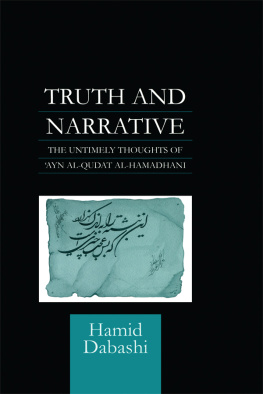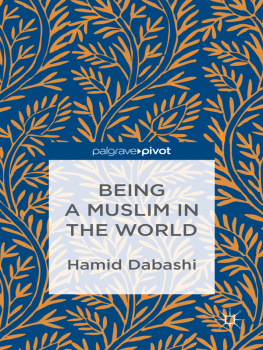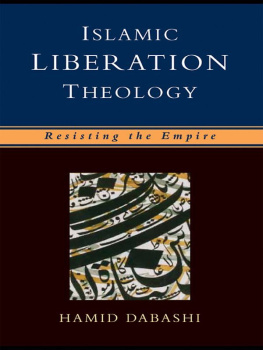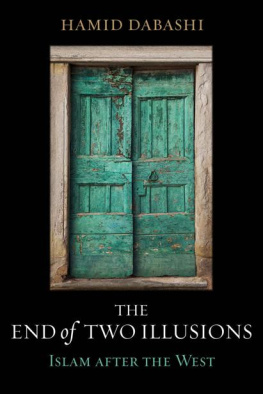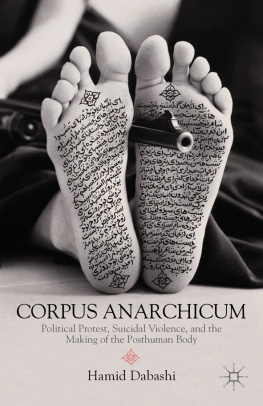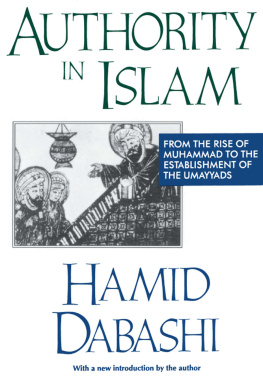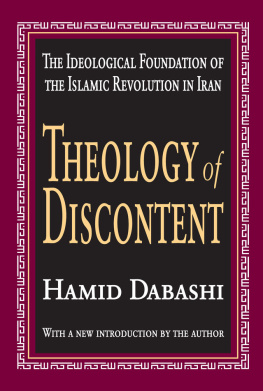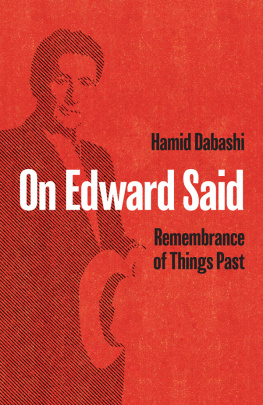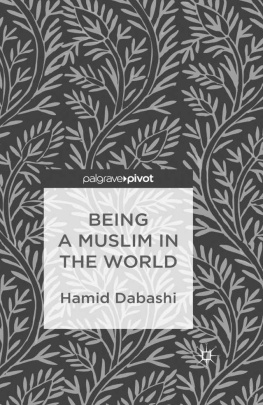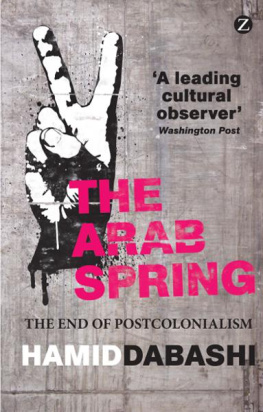Dabashi - Post-Orientalism: Knowledge and Power in a Time of Terror
Here you can read online Dabashi - Post-Orientalism: Knowledge and Power in a Time of Terror full text of the book (entire story) in english for free. Download pdf and epub, get meaning, cover and reviews about this ebook. year: 2017, publisher: Taylor and Francis, genre: Romance novel. Description of the work, (preface) as well as reviews are available. Best literature library LitArk.com created for fans of good reading and offers a wide selection of genres:
Romance novel
Science fiction
Adventure
Detective
Science
History
Home and family
Prose
Art
Politics
Computer
Non-fiction
Religion
Business
Children
Humor
Choose a favorite category and find really read worthwhile books. Enjoy immersion in the world of imagination, feel the emotions of the characters or learn something new for yourself, make an fascinating discovery.

- Book:Post-Orientalism: Knowledge and Power in a Time of Terror
- Author:
- Publisher:Taylor and Francis
- Genre:
- Year:2017
- Rating:4 / 5
- Favourites:Add to favourites
- Your mark:
- 80
- 1
- 2
- 3
- 4
- 5
Post-Orientalism: Knowledge and Power in a Time of Terror: summary, description and annotation
We offer to read an annotation, description, summary or preface (depends on what the author of the book "Post-Orientalism: Knowledge and Power in a Time of Terror" wrote himself). If you haven't found the necessary information about the book — write in the comments, we will try to find it.
Dabashi: author's other books
Who wrote Post-Orientalism: Knowledge and Power in a Time of Terror? Find out the surname, the name of the author of the book and a list of all author's works by series.
Post-Orientalism: Knowledge and Power in a Time of Terror — read online for free the complete book (whole text) full work
Below is the text of the book, divided by pages. System saving the place of the last page read, allows you to conveniently read the book "Post-Orientalism: Knowledge and Power in a Time of Terror" online for free, without having to search again every time where you left off. Put a bookmark, and you can go to the page where you finished reading at any time.
Font size:
Interval:
Bookmark:

Post-Orientalism
Hamid Dabashi
With a new introduction by the author

Originally published in 2009 by Transaction Publishers.
Published 2015 by Transaction Publishers
Published 2017 by Routledge
2 Park Square, Milton Park, Abingdon, Oxon OX14 4RN
711 Third Avenue, New York, NY 10017, USA
Routledge is an imprint of the Taylor & Francis Group, an informa business
All rights reserved. No part of this book may be reprinted or reproduced or utilised in any form or by any electronic, mechanical, or other means, now known or hereafter invented, including photocopying and recording, or in any information storage or retrieval system, without permission in writing from the publishers.
Notice:
Product or corporate names may be trademarks or registered trademarks, and are used only for identification and explanation without intent to infringe.
Library of Congress Catalog Number: 2015000026
Dabashi, Hamid, 1951
Post-orientalism : knowledge and power in a time of terror / Hamid Dabashi.
pages cm
Includes bibliographical references and index.
ISBN 978-1-4128-5580-8
1. Orientalism. 2. Authority. 3. Intellectuals. 4. Middle East Foreign relationsUnited States. 5. United StatesForeign relations Middle East. I. Title.
DS61.85.D33 2015
303.48256073dc23 2015000026
ISBN 13: 978-1-4128-5580-8 (pbk)
ISBN 13: 978-1-4128-0872-9 (hbk)
To the Memory of
Edward W. Said
(1935-2003)
Cherished Colleague, Fallen Friend,
Enduring Comrade
Hamid Dabashi
A historical materialist cannot do without the notion of a present which is not a transition, but in which time stands still and has come to a stop.Walter Benjamin
In my book Post-Orientalism: Knowledge and Power in Time of Terror (2009), which I am delighted to see out in paperback only a few years after its original hardcover, I began by questioning the power of representation (who has it and why) and concluded by suggesting the necessity of changing the interlocutor (habitually imagined as a fictive white man) with whom we seemed to have been conversing and whom we seemed to have been determined to convince of our lot as colonially conditioned. In my conclusion I had suggested we should stop talking to this fake white manthat he does not exist, that he is a figment of our own imagination. Since the publication of Post-Orientalism , my own thinking has moved forward considerably, and now I think within an unfolding succession of framings in which I have explored a variety of interlocutorshistorical, worldly, palpable, real. This unfolding is temporally anchored, rooted as it is in some groundbreaking, world-historic events that have happened since the original publication of this book.
Here in this new introduction I wish to dwell on the moment, which is really a nonmoment, for it is the instance when we declare a mode of knowledge production as dead and done with, as pass, point to a state beyond and yet unnamed, or the moment of the post in my phrasing of post-Orientalism. When exactly is that moment? What time is it when we declare that moment of post? When we have overcome and yet we are not quite destined. It is a purgatorial statewhen a state is phasing out and the next has not quite phased in, or even announced itself.
The central argument of my book is the proposition that knowledge is produced within an episteme that is subject to historical formation and thus eventual exhaustion, and the mode of thinking and knowledge production we call Orientalism is now passed, exhausted, has done its historic function and yielded to the forces of history. Upon this proposition I then try to understand the manner in which the relation of knowledge and power sorts itself out in different modes and manners, one of which for example I called disposable knowledge, coterminous with the rise of think-tanks replacing universities as the most useful location for knowledge production at the service of the avaricious power.
The Arab revolutions of 2010 forward finally crystalized the moment for me when I declared the mode of knowledge production considered postcolonial as having ended, namely delivered its promises, conjugated its paradigm and yielded, willy-nilly, to the unfolding of history. Here the key question that informs any such claim is the temporal monad (as Walter Benjamin called it) evident in the prefix post in post-Orientalism or postcolonialism, as it is in the proposition of the end of either one of them. It is those moments of temporal arrest that have led me back to a reading of a critical passage in Benjamins On the Concept of History (1940) when he discusses his own conception of historical materialism and dwells on the moment he considers the time when time stands still.
A historical materialist cannot do without the notion of a present which is not a transition, but in which time stands still and has come to a stop. For this notion defines the present in which he himself is writing history. Historicism gives the eternal image of the past; historical materialism supplies a unique experience with the past. The historical materialist leaves it to others to be drained by the whore called Once upon a time in historicisms bordello. He remains in control of his powers, man enough to blast open the continuum of history.
In the proposition of a stage when we have overcome Orientalism, or reached the end of postcolonialism, we are in fact revisiting Benjamins temporal thesis regarding historical materialism. Following Benjamins argument, when a moment is transitional, it cannot see itself as transitional, nor can a critical theorist do without that moment when the time has narratively (theoretically) stood still. I can point to the traumatic events of the by now proverbial 9/11, or the US-led invasion of Afghanistan in October 2001, or the US-led invasion of Iraq in March 2003, or the rise of the Green Movement in Iran in 2008, or the commencement of the Arab Revolutions in 2010 as such unique and transformative moments when an epistemic shift allows for newer narrative, thematic, and theoretical possibilities. The time of the thinking about these world-historic events is the time that has come to a stopteleologically speaking. The present of the thinker is therefore ahistorical precisely in order for the argument to be historically rooted. The moment is contemplative not chronological. The past is made pastand the present presentprecisely at that critical moment of thinking when the thinker has placed the thinking outside the fluidity of history in order to capture a snapshot of it and see it better. If we are not to be seduced into the historicisms bordello, as Benjamin fancies it, then the critical instance we have dubbed post is a necessary narrative way-station, a refuge, a haven where we can afford to be in and out of history at one and the same time. Benjamins criticism of historicism is precisely where the terms of historical emancipation find their moment:
Historicism rightly culminates in universal history. Materialistic historiography differs from it as to method more clearly than from any other kind. Universal history has no theoretical armature. Its method is additive; it musters a mass of data to fill the homogeneous, empty time. Materialistic historiography, on the other hand, is based on a constructive principle. Thinking involves not only the flow of thoughts, but their arrest as well. Where thinking suddenly stops in a configuration pregnant with tensions, it gives that configuration a shock, by which it crystallizes into a monad.
Font size:
Interval:
Bookmark:
Similar books «Post-Orientalism: Knowledge and Power in a Time of Terror»
Look at similar books to Post-Orientalism: Knowledge and Power in a Time of Terror. We have selected literature similar in name and meaning in the hope of providing readers with more options to find new, interesting, not yet read works.
Discussion, reviews of the book Post-Orientalism: Knowledge and Power in a Time of Terror and just readers' own opinions. Leave your comments, write what you think about the work, its meaning or the main characters. Specify what exactly you liked and what you didn't like, and why you think so.

